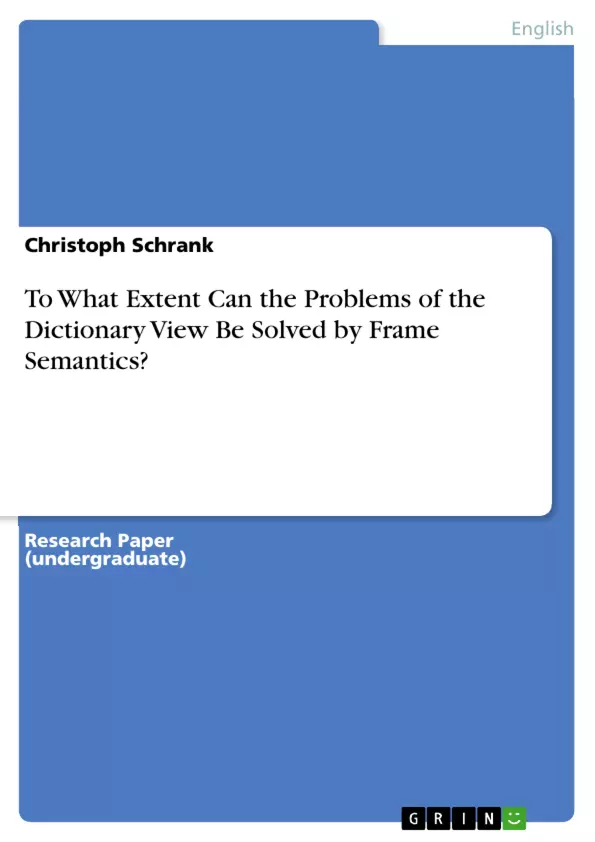This paper deals with the theory of Frame Semantics, a concept developed by the American linguist Charles J. Fillmore. The basic assumption of frame semantics is that in order to understand a word properly, its "frame," i.e. all the knowledge relating to this word is necessary. I will use this theoretical framework to explore the question to what extent the problems of the so-called dictionary view can be solved by Frame Semantics.
Table of Contents
- Introduction
- Dictionary View
- Problems of the Dictionary View
- Frame Semantics
- Encyclopadic View
- Frame Semantics
- The Commercial Event Frame
- The RISK Frame
- The Speech Event Frame
- How Can Frame Semantics Solve the Problems of the Dictionary View
- Conclusion
Objectives and Key Themes
This paper aims to explore the theory of Frame Semantics, a concept developed by Charles J. Fillmore, to investigate the extent to which it can address the limitations of the traditional dictionary view of word meaning. The paper examines the problems associated with the dictionary view, providing a comprehensive analysis of Frame Semantics and its potential solutions.
- Dictionary View vs. Encyclopaedic View
- Problems of the Dictionary View
- Frame Semantics and its Principles
- The Relationship between Semantics and Pragmatics
- The Potential of Frame Semantics to Solve the Problems of the Dictionary View
Chapter Summaries
- Introduction: Introduces the paper's focus on Frame Semantics, its aim to address the problems of the dictionary view, and the theoretical framework it will employ.
- Dictionary View: Defines the traditional dictionary view in semantic theory, which distinguishes between dictionary knowledge (word meaning) and encyclopaedic knowledge (world knowledge). It highlights the concept of a mental lexicon and uses examples like "bachelor" to illustrate the distinction between denotation and connotation.
- Problems of the Dictionary View: Explores the limitations of the dictionary view, arguing that it fails to account for the complexities of word meaning, including the interplay between denotation, connotation, and background knowledge. It critiques the separation between semantics and pragmatics, arguing that linguistic meaning is influenced by context.
- Frame Semantics: Introduces the encyclopaedic view, which emphasizes the interconnectedness of knowledge and rejects the separation of semantics and pragmatics. It discusses the concept of Frame Semantics, emphasizing its role in understanding word meaning within broader contexts.
Keywords
Frame Semantics, dictionary view, encyclopaedic view, word meaning, semantics, pragmatics, context, knowledge, mental lexicon, denotation, connotation, background knowledge, cognitive semantics.
Frequently Asked Questions
What is Frame Semantics?
Frame Semantics, developed by Charles J. Fillmore, assumes that understanding a word requires knowledge of its entire "frame" or background context.
What are the problems with the "dictionary view"?
The dictionary view fails to account for the interplay between word meaning (denotation) and world knowledge (encyclopaedic knowledge).
How does the "encyclopaedic view" differ from the dictionary view?
The encyclopaedic view rejects the separation of semantics and pragmatics, viewing knowledge as interconnected rather than isolated definitions.
What is an example of a Frame used in the paper?
The paper analyzes the Commercial Event Frame, the RISK Frame, and the Speech Event Frame to illustrate the theory.
Can Frame Semantics solve semantic problems?
The paper explores to what extent Frame Semantics provides better solutions for understanding linguistic meaning within specific contexts.
- Citation du texte
- Christoph Schrank (Auteur), 2015, To What Extent Can the Problems of the Dictionary View Be Solved by Frame Semantics?, Munich, GRIN Verlag, https://www.grin.com/document/462674



